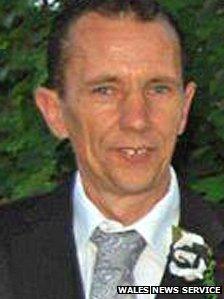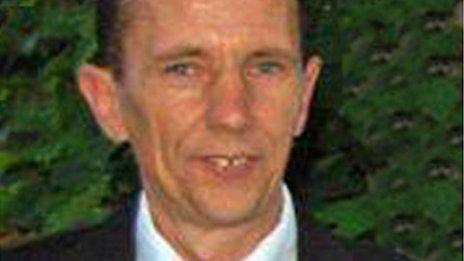Darrell Simester 'was free to leave' forced work farm
- Published

Darrell Simester's family say he had been missing for 13 years
A vulnerable farm worker allegedly forced to work for 13 years at a Newport farm has told Cardiff Crown Court he was free to leave at any time.
Darrell Simester, 44, agreed under cross examination that it was his family who had suggested he was afraid to leave the farm.
Daniel Doran, 67, and David Daniel Doran, 42, deny requiring Mr Simester, from Kidderminster, Worcestershire, to perform forced or compulsory labour.
The charges cover 2010 to 2013.
Mr Simester was found at the farm on the outskirts of Newport last year by his family who had been searching for him for years.
Speaking via video link at the trial, Mr Simester, was cross examined on Friday by lawyers for the defence.
Asked if the Dorans had ever done anything to keep him on the site, Cariad Farm at Peterstone, he said no.
Kevin Molloy, defending Daniel Doran, put it to Mr Simester that his family wanted an explanation as to why he had stayed away for so long.
Mr Molloy said: "To make your family happy, to please them, that's why you said you had to stay on the farm."
Mr Simester answered: "That's right."
Mr Molloy continued: "In reality you could have left at any time."
To which Mr Simester answered: "Yeah".

Daniel Doran and his son David Daniel Doran deny forced labour charges
Questioned by Nick Barraclough, QC, defending, Mr Simester confirmed that his parents had contacted PR expert Clarence Mitchell and that the Sun newspaper had paid £5,000 for his story.
"Has the family said you should try and make money out of the case?" Mr Barraclough asked.
"Yes," replied Mr Simester.
Asked about his living conditions on the farm, Mr Simester agreed that in previous interviews he had said that he was taken shopping and could have asked for a toothbrush and for cleaning products to clean his caravan.
He also agreed that he had not always slept on a settee but was given a bed with bedclothes to sleep in and had access to a toilet in an adjacent hut.
When asked why he did not use this toilet, Mr Simester said he did not want to.
'Tobacco'
He agreed that Mr Doran's daughters, Kathleen and Ali, would sometimes wash his clothes and that they used to make him sandwiches in the afternoon to keep him going.
He also agreed that he had a microwave and that he had told a reporter he had a video recorder which he used to record the racing.
The court heard that in a police interview Mr Simester described David Daniel Doran, known as "young Dan," as "nice and gentle".
Mr Barraclough asked whether young Dan had forced him to stay or said anything to make him stay. Mr Simester replied: "No".
Mr Barraclough asked: "Was the agreement that you would be given food, tobacco, clothes and somewhere to sleep and in return for that you had to help on the farm and that's what you agreed to?"
Mr Simester agreed.
He also told the court that he had lived on his own at the farm for a period of weeks and during that time he had the keys to the gates.
The trial continues.
- Published25 September 2014

- Published24 September 2014

- Published16 September 2014
